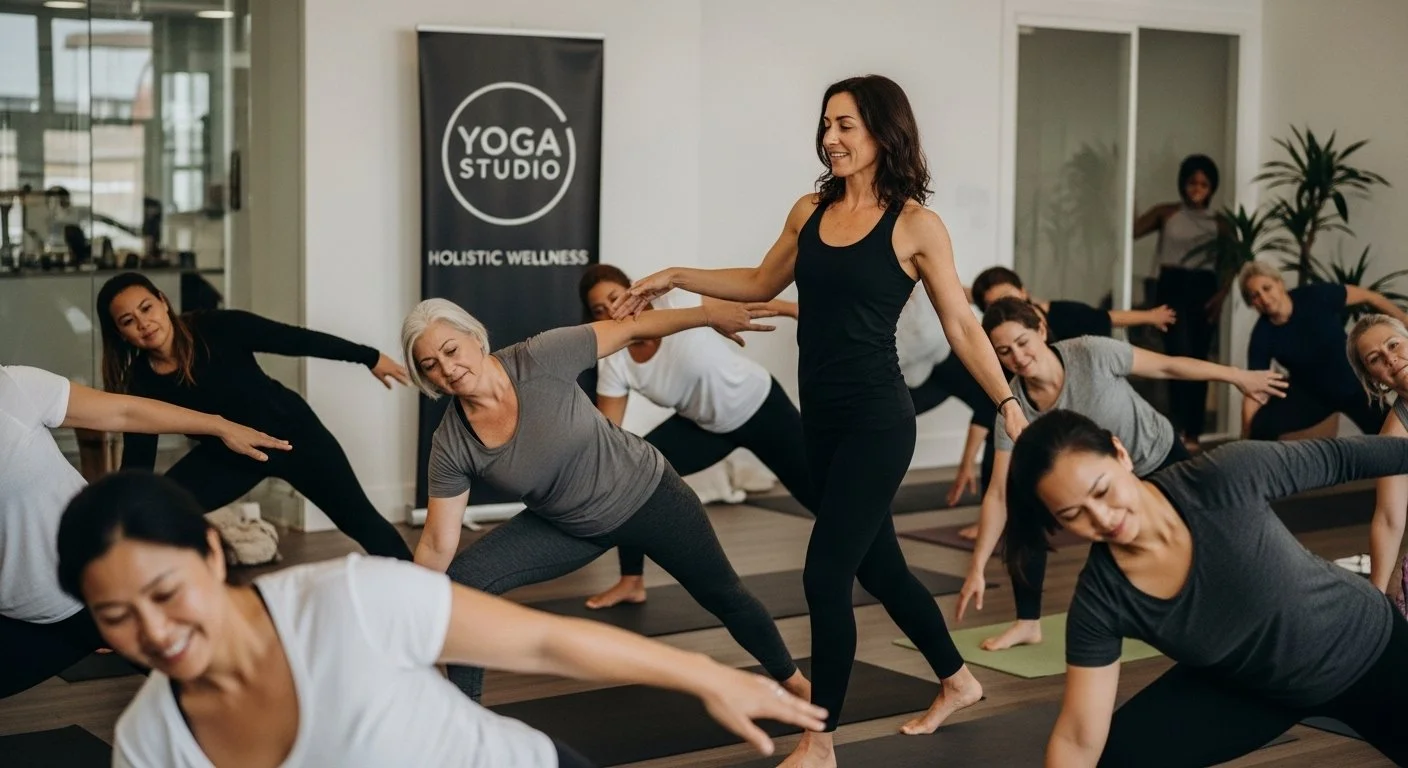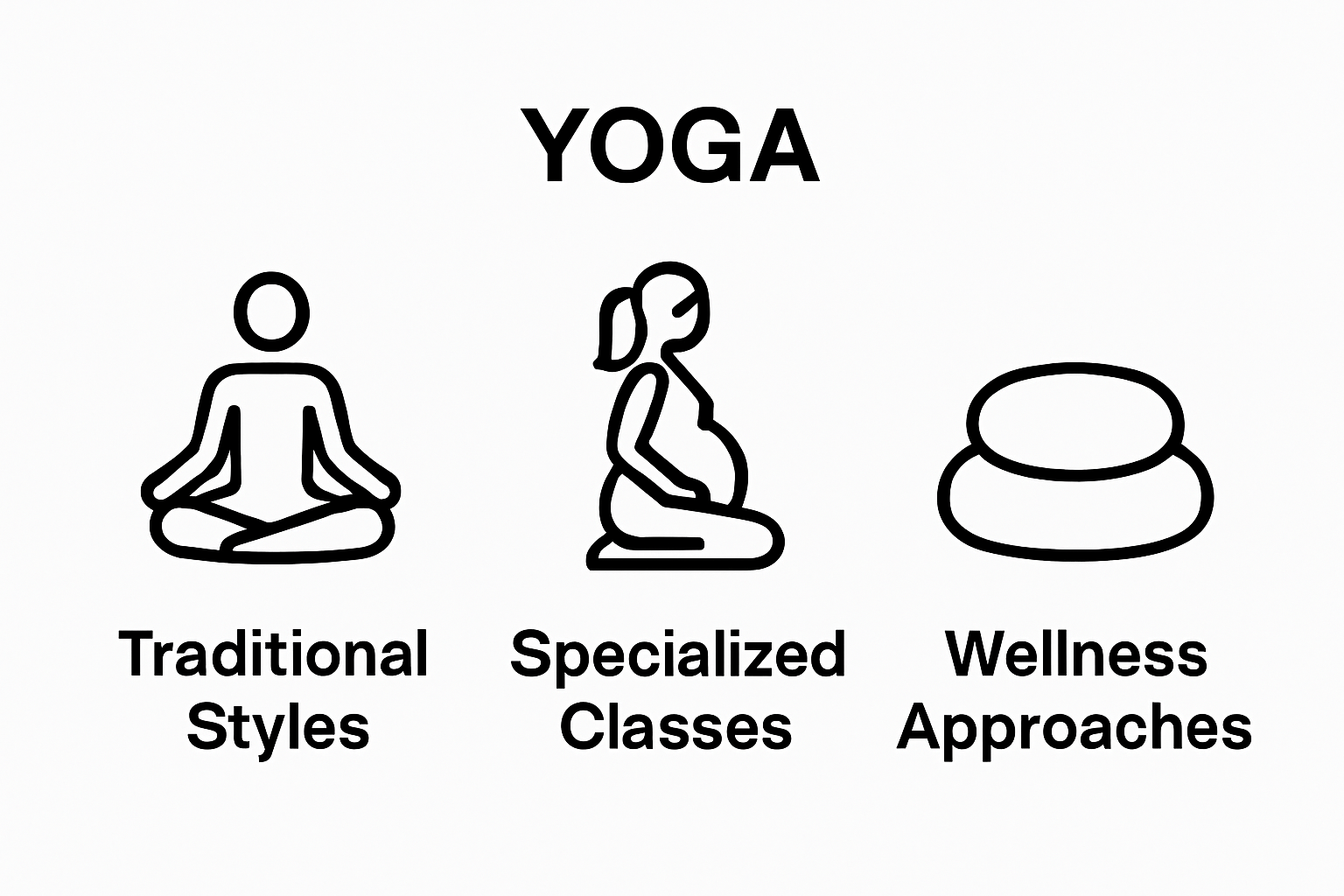What is a Yoga Studio? Understanding the Essentials
Heather Rice
A yoga studio is more than just a place to work out. In fact, studies show that yoga studios nurture not only fitness but also mental health, emotional balance, and even stronger social connections. Most people expect stretching and meditation but modern yoga studios have quietly become the heart of community wellness and personal transformation.
Table of Contents
Quick Summary
TakeawayExplanationYoga studios enhance holistic wellnessThey provide environments focused on physical, mental, and spiritual growth through structured yoga practices.Community building is crucial in studiosClasses and events foster genuine connections and support among practitioners, transforming spaces into holistic community centers.Diverse offerings cater to all needsStudios provide various yoga styles and supplementary services that accommodate different skill levels and wellness goals.Instructors are vital for personal growthThey facilitate a blend of physical instruction and psychological support, creating inclusive and safe spaces for all students.Thoughtful environments enhance experiencesKey design features promote calmness and focus, significantly impacting practitioners' overall wellness and growth.
Defining a Yoga Studio and Its Purpose
A yoga studio represents more than just a physical space for exercise. It serves as a holistic wellness environment designed to support physical, mental, and spiritual growth through structured yoga practices. According to MedlinePlus, yoga connects body, breath, and mind through intentional movement and meditation, transforming these spaces into centers of personal transformation.
The Core Mission of Yoga Studios
Yoga studios fundamentally aim to create inclusive, supportive environments where individuals can explore their physical capabilities, mental resilience, and inner peace. Unlike typical fitness centers, these spaces prioritize comprehensive wellness over mere physical exercise. They offer structured classes led by trained instructors who guide practitioners through various yoga styles, helping them develop strength, flexibility, mindfulness, and stress management techniques.
Below is a comparison table summarizing the key differences between traditional fitness centers and modern yoga studios, as described in the article.
FeatureTraditional Fitness CenterModern Yoga StudioPrimary FocusPhysical exercise and fitnessHolistic wellness (physical, mental, spiritual)Types of OfferingsWeight training, cardio machinesMultiple yoga styles, meditation, workshopsCommunity EmphasisLimited, often individual-focusedStrong community building and supportInstruction/GuidanceGeneral trainers, less personalTrained yoga instructors, personalized guidanceAtmosphereEnergetic, busyCalm, inclusive, accepting environmentApproach to WellnessPhysical health onlyMultidimensional (body, mind, spirit)AccessibilityStandard facilities, less adaptationHighly adaptive, supportive for all levels
Characteristics of Modern Yoga Studios
Research from PubMedreveals that contemporary yoga studios are intentionally designed to be welcoming and diverse spaces. Key characteristics include:
Creating an atmosphere of acceptance and community
Offering multiple yoga styles to accommodate different skill levels
Providing equipment and resources for practitioners
Emphasizing individual growth and personal practice
These studios recognize that yoga is not a one-size-fits-all practice. They adapt their approach to meet diverse participant needs, ensuring everyone from beginners to advanced practitioners feels comfortable and supported in their wellness journey.
The Importance of Yoga Studios in Wellness Culture
Yoga studios have emerged as pivotal institutions within contemporary wellness culture, transcending traditional exercise paradigms to become transformative spaces for holistic personal development. According to research in the American Journal of Health Promotion, these studios serve as critical environments that nurture not just physical fitness, but psychological and emotional well-being.
Cultivating Mindful Community Spaces
Modern yoga studios function as more than workout facilities. They are intentionally designed sanctuaries where individuals can disconnect from external pressures and reconnect with themselves. These spaces create structured opportunities for practitioners to develop self-awareness, practice mindfulness, and build supportive social connections. By offering diverse classes and inclusive environments, yoga studios address the growing societal need for holistic wellness approaches that integrate physical movement with mental and emotional healing.
Wellness Beyond Physical Exercise
Wellness culture has dramatically evolved, with yoga studios at its forefront. They represent a paradigm shift from viewing health as merely physical to understanding it as a multidimensional experience. Key aspects of this transformation include:
Promoting stress reduction and mental resilience
Supporting personal growth and self-discovery
Providing accessible pathways to holistic health
Creating supportive networks of like-minded individuals
These studios recognize that true wellness encompasses physical strength, mental clarity, emotional balance, and spiritual connection. By offering structured practices and expert guidance, they enable individuals to develop comprehensive strategies for personal well-being that extend far beyond traditional fitness models.
Different Types of Yoga Studios and Offerings
Yoga studios have evolved into diverse environments that cater to a wide range of practitioners, offering unique experiences beyond traditional fitness spaces. According to research from the National Institutes of Health, these studios provide multiple yoga styles and specialized approaches to meet individual wellness needs.
Diverse Yoga Practice Environments
Modern yoga studios distinguish themselves through specialized focuses and unique teaching philosophies. Some studios emphasize physical fitness and athletic performance, while others prioritize spiritual growth, meditation, and holistic healing. These variations allow practitioners to select environments that align with their personal wellness goals, creating tailored experiences that go beyond generic exercise classes.
Categories of Yoga Studio Offerings
Contemporary yoga studios typically provide a comprehensive range of classes and experiences designed to accommodate different skill levels, physical capabilities, and wellness objectives. Key offerings include:
Traditional Styles: Hatha, Vinyasa, Iyengar, and Ashtanga yoga practices
Specialized Classes: Prenatal yoga, therapeutic yoga, senior yoga, and children's yoga
Wellness Approaches: Meditation sessions, breathwork workshops, and restorative practices
Supplementary Services: Private instruction, wellness consultations, and holistic health workshops
These diverse offerings reflect the complex and evolving nature of contemporary yoga practice, recognizing that wellness is a multifaceted journey requiring personalized and adaptive approaches. By providing such varied experiences, yoga studios ensure accessibility and inclusivity for practitioners with different backgrounds, physical conditions, and personal objectives.
This table organizes the main categories of offerings typically found at modern yoga studios, making it easier to scan and compare their key features.
CategoryDescriptionExamplesTraditional StylesClassical and established forms of yoga practiceHatha, Vinyasa, Iyengar, AshtangaSpecialized ClassesTailored to specific populations or needsPrenatal yoga, therapeutic yoga, senior yogaWellness ApproachesIntegrative classes that support holistic well-beingMeditation sessions, breathwork workshops, restorative practicesSupplementary ServicesAdditional offerings to support overall wellnessPrivate instruction, wellness consultations, holistic health workshops
How Yoga Studios Foster Community and Connection
Yoga studios have transformed from simple exercise spaces into powerful platforms for building meaningful social connections and supportive wellness communities. According to research in the Journal of Primary Care & Community Health, these studios serve as critical environments where individuals develop shared experiences and collective wellness journeys.
Creating Spaces of Belonging
Beyond physical movement, yoga studios intentionally design environments that encourage interpersonal interactions and mutual support. By offering group classes, workshops, and community events, these spaces create opportunities for practitioners to connect beyond their individual mats. The shared experience of practicing yoga together builds a sense of collective vulnerability, respect, and understanding that transcends typical social interactions.
Mechanisms of Community Building
Yoga studios implement several strategic approaches to foster genuine community connections:
Encouraging pre and post-class interactions
Organizing social events and wellness workshops
Creating inclusive environments welcoming diverse practitioners
Facilitating peer support and shared learning experiences
Hosting community-focused wellness initiatives
These intentional strategies transform yoga studios from mere exercise venues into holistic community centers. By prioritizing connection, empathy, and collective growth, these spaces provide practitioners with more than physical training—they offer a sense of belonging, mutual support, and shared purpose in an increasingly fragmented social landscape.
The Role of Instructors and Studio Environment
Yoga instructors and studio environments play critical roles in transforming physical spaces into transformative wellness experiences. According to a national survey of yoga professionals, instructors are far more than movement guides—they are holistic wellness facilitators who adapt practices to individual student needs and create supportive learning atmospheres.
The Multifaceted Role of Yoga Instructors
Instructors serve as more than technical movement coaches. They function as skilled practitioners who blend physical instruction with psychological support, helping students navigate complex mind-body connections. Their responsibilities extend beyond demonstrating poses to creating safe, inclusive spaces where practitioners can explore personal boundaries, develop self-awareness, and cultivate mindful movement practices. These professionals must possess deep understanding of human anatomy, movement mechanics, and psychological principles.
Creating Optimal Studio Environments
A yoga studio's physical and energetic environment significantly impacts practitioners' experiences. Key elements that contribute to an effective wellness space include:
Thoughtful spatial design promoting calm and focus
Appropriate temperature and ventilation
Minimal external distractions
Comfortable flooring and appropriate equipment
Ambient lighting and sound management
These environmental considerations work synergistically with instructor expertise to create transformative wellness experiences. By carefully curating both physical space and instructional approach, yoga studios offer practitioners more than exercise—they provide holistic pathways for personal growth, healing, and self-discovery.
Discover Your Ideal Yoga Studio Experience in Philadelphia
Are you searching for a space that truly embodies the values of community, holistic wellness, and personal growth described in our article about what makes a yoga studio essential? Many people struggle to find a supportive environment that feels both welcoming and tailored to their needs. You want more than generic exercise classes. You are seeking real connection, guidance from experienced instructors, and diverse offerings that nourish your body and mind. If you've felt limited by studios that overlook inclusivity, variety, or true community-building, you are not alone.
Step inside Amrita Yoga & Wellness, the Philadelphia studio designed around the very essentials outlined above. Here, you can choose from a wide variety of yoga styles, including hot yoga and therapeutic sessions. Looking for something beyond mat-based movement? We also offer pilates, barre, tai chi, and massage therapy for well-rounded self-care. Whether you are a beginner or an advanced practitioner, our studio is built for you—with expert instructors, enriching workshops, and an open invitation to join our inclusive community. Now is the time to explore our schedule and join a class at Amrita Yoga & Wellness. Visit our site to see how our offerings align with your wellness goals and experience what an authentic, welcoming yoga studio can do for you.
Frequently Asked Questions
What is the main purpose of a yoga studio?
A yoga studio serves as a holistic wellness environment designed to support physical, mental, and spiritual growth through structured yoga practices, offering a space for personal transformation.
What types of classes are typically offered at yoga studios?
Yoga studios usually offer a variety of classes, including traditional styles like Hatha, Vinyasa, Iyengar, and Ashtanga yoga, as well as specialized classes such as prenatal, therapeutic, and children's yoga, among others.
How do yoga studios foster community and connection among practitioners?
Yoga studios create environments that encourage social interactions through group classes, workshops, and community events, allowing practitioners to connect and support one another in their wellness journeys.
What role do instructors play in a yoga studio?
Instructors in yoga studios are more than just movement guides; they provide holistic support, adapt practices to individual needs, and create a safe, inclusive environment for personal exploration and growth.



